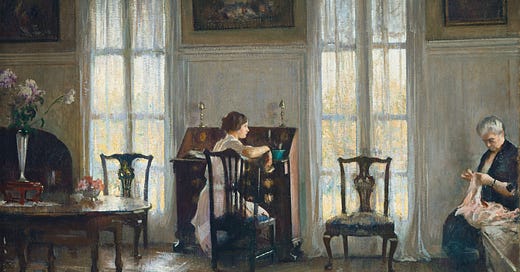Friday mornings #11
Reflecting on the anniversary of Dobbs, and other thoughts from a heat-wave week
Good morning! I hope you’re reading this somewhere safe from The Great Heat Wave, but, if not, that you’re finding creative ways to stay cool.
**
This past Tuesday was the third anniversary of the Supreme Court ruling in Dobbs, which brought an end to Roe v. Wade. I shared some thoughts with Kathryn Lopez to mark the occasion over at National Review, reflecting on what comes next for the pro-life movement:
Pro-lifers need to think about abortion as, first and foremost, a cultural problem. Law and policy matter a great deal, of course. But abortion is, more than anything, a symptom of deep cultural sickness. If our aim is to build a country where our fellow citizens no longer view abortion as a solution, we have to understand this deep sickness and work to heal it. Most of our fellow Americans think abortion is an inevitable part of living in the modern world. Many Americans say they’re pro-life or generally against abortion but nevertheless believe it should remain legal, at least in some circumstances. We need look no further than the unfolding debate over assisted suicide to see that many Americans believe killing can be a solution.
**
I appreciated the thoughts that Alison Centofante shared with Kathryn about motherhood as a key part of building a pro-life culture:
And let’s be honest: everything in our culture tries to scare women away from motherhood. From medicine to marketing, the message is the same — babies will ruin your body, your future, your identity. But I’m watching women rise in resistance. Choosing to have a baby in today’s world isn’t weakness — it’s radical strength. To say yes to sacrifice, to stretch marks and sleepless nights, to real legacy and love — that’s a countercultural revolution. It’s the most rebellious cool thing you can do — it’s a respectful middle finger to a world who too easily looks down on children and the devoted moms and dads who raise them.
**
I spoke about these themes at greater length on the Dobbs anniversary for the Northern Virginia chapter of Legatus and was encouraged to find that the audience was very receptive to my argument that pro-lifers need to think more seriously about what it means to “build a pro-life culture.” What does this mean in practice? How can it be better incorporated into the broader pro-life movement? Like I told Kathryn: Law and policy matter, but abortion springs from cultural sickness, and we have to work to heal it if we want to end abortion.
**
Here at home, my husband and I finished the first season of “Tucci in Italy,” Stanley Tucci’s travel show, which recently moved from CNN to National Geographic. On the whole, I like the style of the NatGeo-produced episodes better than that of the previous two seasons produced by CNN. Apparently, there will be another five episodes with NatGeo eventually.
With one notable aberration—Tucci feels the need to do a short segment promoting adoption for same-sex couples in one of the episodes—the show is fantastic. I especially loved the episode about Abruzzo, which is where all of my relatives on my dad’s side of the family emigrated from.
**
Over the past couple of years, we’ve tried out several long stretches of cancelling Amazon Prime. About 180 million Americans are Prime subscribers; my back-of-the-napkin math suggests this is about half of all Americans.
I have nothing against online shopping or convenience in principle, but living without Prime after relying on it—or feeling like I relied on it—for years has taught us several important lessons.
One major lesson: You probably don’t need that stuff you think you need; you very well might not even want that stuff you think you want. Amazon Prime succeeds in parting you from more of your money than necessary by erasing a bunch of barriers between you and that stuff. One-click is convenient, sure, but it’s also a great way to make you less likely to think about what you’re buying.
Another one: Sometimes it’s okay to drive five, ten, or fifteen minutes to the store to buy it. Convenience culture makes it feel like an enormous burden to get in the car and go anywhere, as though we’re using all that time saved to cure cancer or write the next great American novel. Probably, we’re just using it to scroll Amazon Prime . . .
**
Big news from my alma mater: The Irish Rover independent student newspaper at the University of Notre Dame has officially defeated a lawsuit from a Notre Dame professor who attempted to sue the paper and its editors for defamation after the Rover covered her pro-abortion commentary and activism.
**
Mark Helprin is one of my favorite novelists, so much so that I do indeed have a Google Alert set up with his name. This week, that alert served me up an article in which the author travels to Helprin’s home outside of Charlottesville for an interview. I especially enjoyed his description of the author’s study:
. . . Helprin and I sat in the enormous, nearly two-story high room which serves as his library, office, and workplace, where I had the privilege of interviewing him about his life and work.
One wall of that room deserves special mention. Here were bookshelves about 12-feet high, with a rolling ladder in place allowing access to his entire collection of 7,000 volumes.
I don’t know about you, but 12-foot high bookshelves with a rolling ladder are my idea of a good time.
**
That’s all for this week! If you’ve read any Helprin, I’d love to know what your favorite stories of his are. And what’s your take on Amazon Prime—am I turning into a true curmudgeon? Thanks as always for reading.



